Hong Kong Protests Close Airport, Risk Confrontation With Military
Protests in Hong Kong have been going on for nine weeks now, but they are reaching a point where the patience of the leaders in Beijing is being tested.
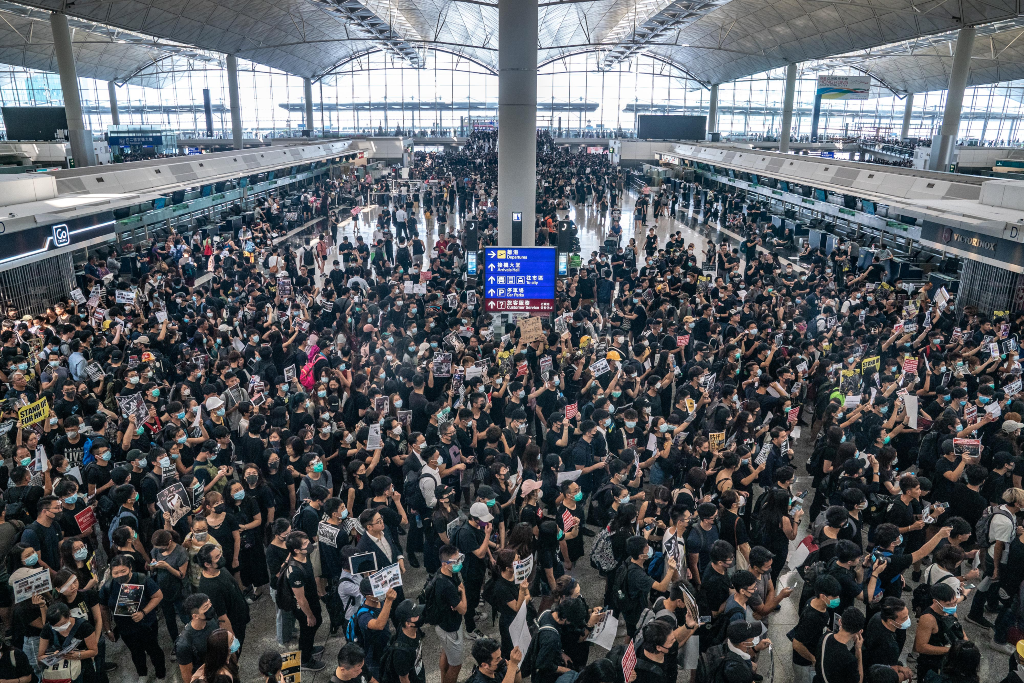
The protests that have rattled Hong Kong for more than two months now entered new territory when thousands of protesters took over the public areas of Hong Kong International Airport, leading to a confrontation with police that closed the airport to departing and arriving flights due to the fact that normal operations were essentially impossible. This was actually the fifth day that protesters have shown up at the airport as part of the systemic protests that started over an extradition bill and quickly expanded to cover a wide-ranging number of issues. Those protests continued into today and have once again led to the closure of the airport. All of this is happening amid signs that Beijing may be losing its patience with the restive province:
HONG KONG — As anti-government demonstrations escalate in Hong Kong, each side is staking out increasingly polarized positions, making it difficult to find a path to compromise between the protesters and China’s ruling Communist Party.
The demonstrations, which began as a fight against a bill that would have allowed Hong Kong residents to be extradited to the mainland, have more broadly morphed into a call for free elections, which largely do not exist in China. To Beijing, it would be a direct challenge to the leadership, tantamount to losing control of Hong Kong.
The once peaceful demonstrations have now intensified, coming into conflict with Hong Kong’s reputation for order and efficiency. Protesters on Monday filled the airport, crippling one of the world’s busiest transportation hubs. Demonstrators returned again on Tuesday, with more flights canceled that day.
China is also projecting more power, raising the possibility of more intense and more frequent clashes with the police. An official in Beijing on Monday condemned the actions of the protesters last weekend, casting it as the first signs of “terrorism.” The Chinese police also appeared to conduct large-scale exercises across the border from Hong Kong in Shenzhen, a city on the mainland.
“We are at a crossroads,” said Martin Lee, a democracy advocate and former lawmaker. “The future of Hong Kong — the future of democracy — depends on what’s going to happen in the next few months.”
The unrest is exposing the inherent conflict in the political experiment that began when China reclaimed Hong Kong from Britain in 1997, an ambitious attempt to marry Beijing’s brand of authoritarianism with a bastion of civil liberties.
China’s top leader, Xi Jinping, wants to make Hong Kong more like a mainland city, using economic incentives to buy happiness and propaganda to win loyalty. The protesters, who represent a wide swath of Hong Kong, want a government that looks out for their interests, not just Beijing’s, to help resolve problems like astronomical housing prices and low wages.
The two sides no longer seem to recognize each other’s concerns.
The protesters recently adopted a slogan with pro-independence roots: “Liberate Hong Kong, revolution of our times.” Many say they use it to describe their desire for a political voice. But Beijing has held up the slogan as evidence that the protesters support independence.
All of this began roughly nine weeks ago now when residents began taking to the streets to protest an extradition bill under consideration by the city’s legislature. With good cause, the protesters feared that if it became law the bill would make it easier for the government in Beijing to extradite Hong Kong residents and foreigners to mainland China. This would be significant, of course, because on the mainland these people would be without the civil liberties protections they ha pursuant to the 1997 agreement that returned Hong Kong to Chinese control. That agreement roughly abides by the “one country, two systems” idea that former Chinese leader Deng Xiaoping advanced during his time in power. Initially, the city government responded to the protests by suspending consideration of the bill, but that wasn’t sufficient for protesters who continued their protests until the government relented by formally pulling the bill from consideration.
It quickly became apparent, though, that this wasn’t sufficient and the protesters have expanded their demands to include the removal of several key city officials. The protests expanded at that point, bringing more people to the streets, and also appeared to have become violent, largely in response to harsh measures by city police and what appear to have been the actions of provocateurs. By that point, even the leader of Hong Kong declaring the extradition bill dead wasn’t enough for the protesters, who have continued to take the streets in smaller protests during the week and large ones on the weekends. The most recent protest took the form of a largely successful General Strike that may be repeated on October 1st when China marks the anniversary of the founding of the Chinese Communist Party. The recent shift of the attention of protesters from the streets to the airport is, no doubt, an effort to bring international attention to their movement while at the same time continuing their protests in the streets.
All of this has obviously tested the patience of the leadership in Beijing. So far, while the police in Hong Kong have on occasion used tear gas and batons to break up protests, things have been relatively restrained compared to how they would likely react if the protests were taking place anywhere else in China. As noted in the article linked above, the protests have veered into calls for independence at times, and in some cases included the flying of the pre-1997 flag that was flown when the city was under British rule. Obviously, independence is something that Beijing is not going to allow, and the more the protests move in that direction the higher the risk becomes of some kind of punitive action from the mainland will be notwithstanding the fact that it would take place before the world’s television cameras. Already there are reports of a military buildup in the mainland territory bordering Hong Kong, raising concerns that intervention could come without any warning.
As I have said before, Beijing has good reason to give Hong Kong latitude even in the face of these protests:
Another factor motivating China to restrain itself in Hong Kong, of course, is the fact that the leadership is wise enough to know that doing so would be a disaster both in terms of the widespread coverage it would receive from the western media, which is well-established in the city, and internationally. Even in this era where prosperity is becoming more widespread in China a whole, Hong Kong remains the goose that laid the golden egg and the leadership in Beijing is obviously too smart to mess that up. There’s always the possibility that they will lose patience in one of these situations and that they will overreact to the protests in Hong Kong as they did in Tiananmen. At that point, though, they may find that they’ve bitten off more than they can chew.
This is likely why the leadership has exercised patience. How long that patience lasts is now being tested.

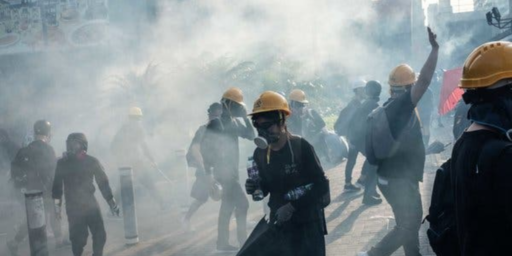
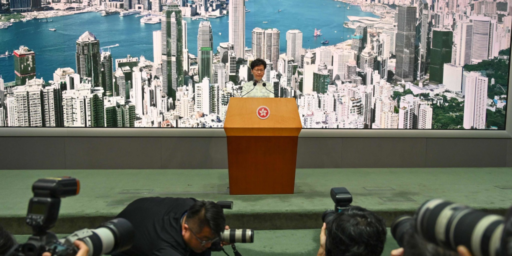
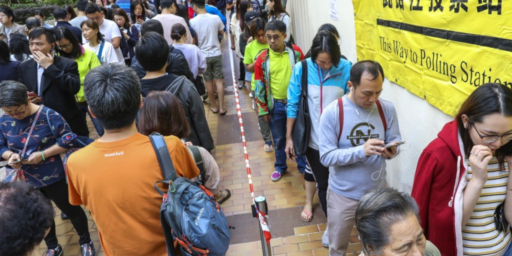
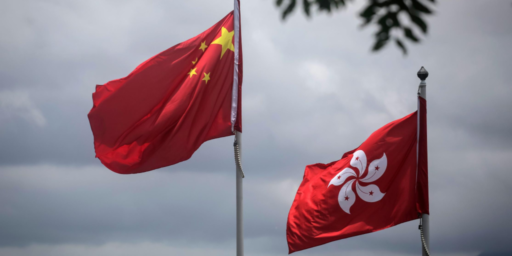

They bit off more than they could chew back in 1997. The One China, 2 Systems was delusional in that authoritarian rule always tries to impose it’s will on all it’s subjects.
This is a troubling situation. Is there anything we can do to avert real human suffering? I remember when the UK turned Hong Kong over to the PRC, P.J. O’ Rouke, a genuinely funny conservative (I know, sounds like an oxymoron), suggested that we airdrop a couple of million green cards. His rationale was that this would be good for the US since the new immigrants would come from an ancient culture that emphasized hard work and achievement and has a great cuisine. Seriously, we should welcome the oppressed. We shamefully turned away Jews before WW II. The Marielistas turned out good in the long run. I live surrounded by Vietnamese who work hard and make great Pho. Tut-tuting about the PRC won’ impress them, anyone else, nor help the HK’ers. Taking a bunch of them in as refugees will be noted. It would be a meaningful response. Let’s do it!
I have a self-interest. I love the cuisine and patronize a HK seafood place that is great. We need more like it.
Hong Kong police are being accused of using undercover officers dressed as protestors to infiltrate and arrest demonstrators in the Chinese territory, where unrest has continued for weeks.
Where have I heard of this before?
Continuing its use of both overt and covert tactics, such as surveillance, infiltration, and intimidation, Chicago’s Red Squad in the 1920s under Make Mills shifted its attention from anarchists to individuals and organizations who the Red Squad believed to be Communist. Casting a wide net, the squad by 1960 had collected information on approximately 117,000 Chicagoans, 141,000 out-of-towners, and 14,000 organizations. After the 1968 Democratic National Convention, the Red Squad expanded its targets from radical organizations like the Communist and Socialist Workers Parties to minority and reform organizations, including the American Civil Liberties Union, National Association for the Advancement of Colored People, National Lawyers Guild, and Operation PUSH
Source
Also see Trojan horse
I felt at the time that England was making a big mistake turning Hong Kong over to the “People’s Republic of China”. England knows how to govern and manage colonies and other areas. Think of General Allenby, Colonel Lawrence, and General Gordon.
Now even some of the demonstrators are getting out of control and injuring people.
What needs to happen is that Trump and Boris need to have a sit down with the Chinese leaders, hash some things out, clear the air, and get some things straight. Trump could take the Secretary of State Pompeo with him, and Guliani could go along too. Trump could offer our help. One option on the table would be returning Hong Kong to England’s control if these troubles persist. And they need to clearly understand there will be no repeat of Beijing.
The U.S. sent troops over there during the famous Boxer Rebellion. It can be done again.
A violent response by PRC is likely to backfire — they had a much better control of the media during and after Tiananmen Square. Now, there are roughly as many cameras as citizens, all connected to the (censored) internet — even with the Great Firewall, that’s going to get out of Hong Kong and then back into mainland China.
The Great Firewall is pretty good, but it’s not perfect. And the inevitable PRC propaganda stories about Hong Kong will make it harder to find and filter out contrary narratives that look the same to computers.
@Tyrell:..The U.S. sent troops over there during the famous Boxer Rebellion. It can be done again.
The United States was one of an Eight Nations Alliance that participated in that war. The US provided 3400 troops and two warships out of a total of 56,700 troops and 54 ships.
I can only assume you are ready to recruit the governments of Britain, Australia, India, Germany, France, Austria-Hungary, Italy and Japan to accompany the United states on this expedition.
Of course back in 1900 the Chinese Army did not have nuclear weapons like they do today to repel an invasion of their soverign territory so you might have trouble getting other countries to go along.
I expect the Chinese government to strike at the Hong Kong protesters very soon and very hard.
(1) It’s important to send a message far and wide that NOBODY argues successfully with the Chinese Communist Party.
(2) The real lesson of Tiananman Square is that after the blood is swept up and enough people shoved into re-education camps for long enough the populace goes along with repression as long as order and prosperity is maintained. It’s important to maintain control of social media, but the Party has this well in hand. Let the offspring of wealthy Hong Kongers fly like birds to exile in Canada and Europe and the USA — they won’t be coming back, they won’t be missed, and they’ll have little importance in the politics of their new homelands.
(3) Donald Trump is the least likely American president ever to object to these necessary hard measures, and since his re-election is not guaranteed, the time to act is NOW. His successor will not be able to reverse matters.
Isn’t international politics fun!